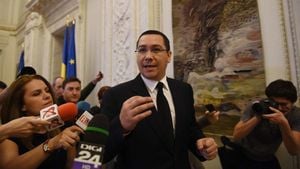The 2024 U.S. presidential election has sparked significant conversation across the country, especially surrounding the aftermath and the growing allegations of election fraud. With former President Donald Trump declared the winner against Vice President Kamala Harris, many questions have arisen concerning the integrity of the election process and the legitimacy of the results. What does this mean for the voters and the political climate moving forward?
According to recent exit polls conducted by YouGov and reported by The Hill, approximately 75 percent of registered voters believe Trump’s victory was legitimate. This sentiment is particularly pronounced among Republican voters, with 97 percent expressing confidence in the outcome. Interestingly, the same survey revealed more than two-thirds of respondents felt their votes were counted accurately, indicating growing public trust among some participants, but also exposing worrying factions still skeptical of the electoral process.
The elections saw Trump winning key battleground states including Arizona, Pennsylvania, and Georgia, and even making gains in typically Democratic strongholds like Illinois and New Jersey. Despite this victory narrative, the elections have not been without controversy. Nearly 46 percent of voters anticipate protests related to the results, underscoring divisions within the electorate. Particularly, Trump's supporters are more inclined to expect unrest, amplifying the tension permeated within political discourse.
Simultaneously, unconfirmed and unfounded claims of election fraud have surfaced, muddying the waters of trust surrounding the electoral outcome. Republican Congressman John Duarte and others contend there is no substantiation for allegations concerning electoral misconduct. Duarte stated he sees “no evidence or aberrations” indicative of fraud, emphasizing the need for patience as results are finalized. Other California Republicans have also expressed skepticism about these accusations. Many highlight the importance of allowing the counting process to conclude without jumping to conclusions, concerned about how unfounded claims could harm the party overall.
For example, Rep. Young Kim noted, “I don’t think it’s helpful to make any judgments or comments until the count has been completed.” This portion of moderation hints at internal party conflicts, contrasting with the loud voices from the far-right calling for widespread investigations.
Undoubtedly, accusations such as those aired by Congresswoman Marjorie Taylor Greene, who suggested Democrats were stealing the election without presenting any evidence, have only served to exacerbate divisions. Such claims of election malfeasance mix with conspiracy theories to create narratives dangerously close to voter intimidation, according to some analysts.
Aside from individual allegations, voices such as Stephen Spoonamore, who sent a post-election letter to Vice President Harris, claimed it is “near certainty” the election results were manipulated. His assertions include claims of electronic voting systems being compromised and ballots having been doctored to favor Trump. Nevertheless, reports from Snopes indicate Spoonamore’s claims have not held up under scrutiny. Data comparisons reveal discrepancies against official election results, rendering much of his accusations speculative at best.
Beyond the accusations, the statistical realities reflect mixed sentiments among voters. While only 9 percent of poll respondents see sufficient evidence of fraud to question the legitimacy of the results, the expectation of violence or disruption remains palpable. Close to 36 percent of voters think violence could arise following the election, with stark contrasts between the expectations of supporters of both candidates.
Turning attentions to Kentucky, the state found itself conducting post-election inquiries to safeguard against any possible irregularities. Attorney General Russell Coleman highlighted the aim of maintaining confidence among Kentuckians, stating, “We're undertaking this effort to help every Kentuckian have faith their elections are free, fair and secure.” Four counties, including Warren County, were randomly selected for scrutiny, with officials intending to audit the ballots thoroughly to address concerns raised from over 700 reports made to the Election Fraud Hotline.
County Clerk Lynette Yates, whose jurisdiction is under examination, expressed faith in the systems and checks they had followed during their polling processes. With the turnout being slightly lower than expected at 60 percent, she noted, “Everything went very smoothly as far as we were concerned.” Yates's reassurance reflects the broader feeling among many officials who see merit in allowing the post-election inquiries to proceed without unnecessary panic.
On the national stage, tensions simmer as discussions of election integrity draw varied reactions. The mainstream media often appears fragmented, covering each side of the argument but perhaps not with the depth or nuance required to adequately address every voter’s concerns. With Chuck Todd from NBC’s Meet the Press questioning whether both Democrats and Republicans are unnecessarily inciting fear surrounding voter fraud without basis, the dialogues are perplexing.
Electoral procedures remain heavily criticized even among voters who broadly accept the outcomes. Some argue the volume of mail-in ballots and long count periods lead to unnecessary uncertainty. California, for example, is known for its slow vote-counting process, primarily for ballots mailed post-Election Day. This time-consuming method has engendered suspicion among voters who are unsure about the efficacy and transparency of mail-in voting.
Communications among party loyalty also display fractures as Republicans who accept the results argue vocally against the rhetoric of fraud. “It’s not helping,” they claim when hearing unfounded allegations against the election process. They advocate for ensuring focus remains on the upcoming Congress and future elections rather than getting tangled up in divisive narratives.
With the count commenced and opinions juxtaposed, the coming months will surely amplify how these events develop. Between legal challenges advancing through various states, voter confidence remains at stake. Discussions surrounding voter identification laws and how they intersect with equal access to the ballot box continue to push the boundaries of these partisan debates.
Importantly, the media’s role remains pivotal. If outlets remain vigilant and prioritize fact-checking over sensationalisms, the overall electorate may find more solidarity moving forward. The nation will undoubtedly keep its eyes peeled on how both parties navigate the sensitive waters of election integrity, seeking to channel the best outcome for future voter affirmations. With open wounds being discussed openly, one can only hope for political unity transcending individual candidates.



